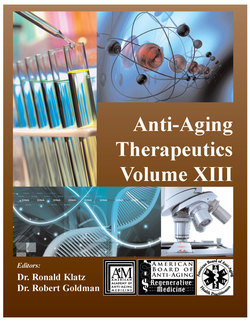Читать книгу Anti-Aging Therapeutics Volume XIII - A4M American Academy - Страница 53
На сайте Литреса книга снята с продажи.
Resveratrol and Telomerase
ОглавлениеThe question of extending replicative cellular lifespan applies to both disease risk reduction and to the broader issue of overall lifespan extension. A highlight of recent research is the recognition that enhanced expression of telomerase extends replicative lifespan in several models. Telomeres, repetitive DNA sequences at the ends of chromosomes, function to provide genetic stability by shortening with each replication cycle, and thereby prevent loss of integrity to genes within the chromosome. The number of replication cycles is therefore predetermined in somatic cells, known as the Hayflick limit, at which point the cells enter senescence. A major emphasis of anti-aging research has therefore been directed at unearthing methods of activating telomerase and rebuilding telomeres.
The key to understanding and manipulating telomerase is determining its function in immortal cancer cells versus normal cells. In tissue cultures of metastatic breast cancer, resveratrol has been shown to down-regulate telomerase expression, resulting in enhanced anti-tumor activity beyond its pro-apoptotic and other inhibitory effects. Similar effects have been documented with colon cancer cells in vitro, in a dose-dependent manner, though suppression of telomerase expression requires relatively high concentrations of resveratrol. On the other hand, resveratrol delays the onset of senescence in endothelial progenitor cells by significantly up-regulating telomerase activity.19 Immortalization of normal cells has been accomplished with resveratrol under certain conditions in epithelial progenitor cells. This involves converting telomerase from discontinuous to continuous expression, but only in the presence of a mutation in the p53 tumor suppressor protein, which is involved in cell replication. The effect is prevented in the presence of progesterone.
These findings, while they provide important clues to controlling telomerase activity, are somewhat contradictory and these systems are highly complex. Resveratrol may prove to be useful as a telomerase regulator but its use remains highly speculative and adverse effects are possible. Further research is required and it may be many years before the answers are in.
